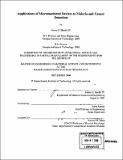| dc.contributor.advisor | Subra Suresh. | en_US |
| dc.contributor.author | Hardin, James O. (James Otey) | en_US |
| dc.contributor.other | Massachusetts Institute of Technology. Dept. of Materials Science and Engineering. | en_US |
| dc.date.accessioned | 2007-05-16T18:28:02Z | |
| dc.date.available | 2007-05-16T18:28:02Z | |
| dc.date.issued | 2006 | en_US |
| dc.identifier.uri | http://hdl.handle.net/1721.1/37382 | |
| dc.description | Thesis (M. Eng.)--Massachusetts Institute of Technology, Dept. of Materials Science and Engineering, 2006. | en_US |
| dc.description | "September 2006." | en_US |
| dc.description | Includes bibliographical references (p. 49-51). | en_US |
| dc.description.abstract | Of the many micromachined diagnostic devices currently being developed, suspended microchannel resonator technology seems unique in that is not a scaling down of an existing technique and does not require labeling of the target cell. This technology has the potential to become an important diagnostic tool of diseases that cause a change in the mechanical properties of cells in blood. Malaria and cancer are good examples of this type of disease and both could benefit from more effective testing methods. For this to be accomplished, complementary technologies like filtration and microfluidic interconnects will also have to be developed. However, substantial funding will be required for this development. The cancer market appears to be the most favorable by an order of magnitude in terms of funding. There are many business strategies to take advantage of this technology. Each has its own set of risks and possible gains. | en_US |
| dc.description.statementofresponsibility | by James O. Hardin, IV. | en_US |
| dc.format.extent | 51 p. | en_US |
| dc.language.iso | eng | en_US |
| dc.publisher | Massachusetts Institute of Technology | en_US |
| dc.rights | M.I.T. theses are protected by copyright. They may be viewed from this source for any purpose, but reproduction or distribution in any format is prohibited without written permission. See provided URL for inquiries about permission. | en_US |
| dc.rights.uri | http://dspace.mit.edu/handle/1721.1/7582 | |
| dc.subject | Materials Science and Engineering. | en_US |
| dc.title | Applications of micromachined devices to malaria and cancer detection | en_US |
| dc.type | Thesis | en_US |
| dc.description.degree | M.Eng. | en_US |
| dc.contributor.department | Massachusetts Institute of Technology. Department of Materials Science and Engineering | |
| dc.identifier.oclc | 122904250 | en_US |
